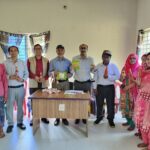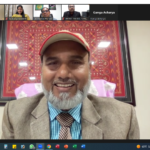 The SAARC Agriculture Centre (SAC) in partnership with the International Food Policy Research Institute (IFPRI) – South Asia and the Bangladesh Agricultural Research Council (BARC) successfully completed a transformative three-day training workshop titled “Training and Validation Workshop on Modules of Climate Smart Agriculture Technologies in South Asia”. This landmark event, held from 22 to 24 April 2024 at BRAC CDM in Gazipur, Bangladesh, brought together 22 dedicated scientists, researchers, extension workers, and policymakers from Bangladesh, Bhutan, India, Nepal, and Sri Lanka.
The SAARC Agriculture Centre (SAC) in partnership with the International Food Policy Research Institute (IFPRI) – South Asia and the Bangladesh Agricultural Research Council (BARC) successfully completed a transformative three-day training workshop titled “Training and Validation Workshop on Modules of Climate Smart Agriculture Technologies in South Asia”. This landmark event, held from 22 to 24 April 2024 at BRAC CDM in Gazipur, Bangladesh, brought together 22 dedicated scientists, researchers, extension workers, and policymakers from Bangladesh, Bhutan, India, Nepal, and Sri Lanka.
In a region where agriculture serves as the backbone of economies and livelihoods, the impact of climate change poses significant challenges. Extreme weather events and shifting climatic patterns threaten crop yields and food security, emphasizing the urgent need for sustainable agricultural practices. Recognizing this imperative, SAC and IFPRI developed climate smart agriculture (CSA) training modules to train farmers and extension agents with funding support from the project ‘Consortium for Scaling-up Climate Smart Agriculture in South Asia (C-SUCSeS).’ This workshop served as a pivotal platform for fine-tuning and validating 10 training modules on CSA. Through a combination of presentations, engaging discussions, and hands-on practical sessions, participants had the opportunity to contribute their expertise and refine the content of modules to ensure their relevance and effectiveness.
 The inauguration ceremony was graced by the Chief Guest Dr. Debasish Sarker, Director General of Bangladesh Agricultural Research Institute (BARI). Dr. Sarker emphasized the pivotal role of CSA in bolstering agricultural systems amidst climate change and highlighted its potential for enhancing productivity, resilience, and sustainability. He underscored the importance of collaborative efforts in sharing knowledge and implementing location-specific, climate-smart solutions.
The inauguration ceremony was graced by the Chief Guest Dr. Debasish Sarker, Director General of Bangladesh Agricultural Research Institute (BARI). Dr. Sarker emphasized the pivotal role of CSA in bolstering agricultural systems amidst climate change and highlighted its potential for enhancing productivity, resilience, and sustainability. He underscored the importance of collaborative efforts in sharing knowledge and implementing location-specific, climate-smart solutions.
Throughout the workshop, participants engaged in rigorous discussions, refining ten comprehensive training modules tailored to the specific needs of South Asian countries. Gender considerations were prioritized, ensuring inclusivity and meaningful participation from female farmers and experts.
In the closing ceremony, participants were invited to the premises of the Bangladesh Agricultural Research Institute (BARI), one of the largest research institutes and a trusted partner of the C-SUCSeS Project in Bangladesh. During the certificate award ceremony, Dr. Md. Harunur Rashid, the Director of SAC, commended the diverse range of participants, including researchers, scientists, farmers, and knowledge management experts. He expressed that it is in fact, not training rather it is a sharing of knowledge, experience, and ideas for the betterment of modules that will be helpful for the dissemination of technology. Welcoming the delegates to the institute, Dr. Debasish Sarker, the Director General of BARI, highlighted the significance of the three-day program under the C-SUCSeS project. He emphasized the importance of finalizing CSA training modules on direct seeded rice, drip irrigation, protected agriculture, AWD, bed planting, and sustainable land management to address climate change issues effectively in the region.
 The distinguished Chief Guest, Dr. Sheikh Mohammad Bakhtiar, Chairperson of the Bangladesh Agricultural Research Council and Chair of the Project Steering Committee of the C-SUCSeS Project expressed gratitude to the participants for completing the three-day training and validation workshops on CSA. Reflecting on his emotional attachment to the project, he shared, “During my tenure as Director SAC, I spent three years building this project.” He underscored the progress of agriculture in Bangladesh, attributing it to government support, technological advancements, and robust institutional infrastructure. He acknowledged the importance of technology in agricultural development while acknowledging the challenges ahead. Dr. Bakhtiar emphasized the need for climate-smart technology and thanked the organizers for conducting the workshop on CSA against the backdrop of rising temperatures and the imperative of sustainable agricultural practices in South Asia.
The distinguished Chief Guest, Dr. Sheikh Mohammad Bakhtiar, Chairperson of the Bangladesh Agricultural Research Council and Chair of the Project Steering Committee of the C-SUCSeS Project expressed gratitude to the participants for completing the three-day training and validation workshops on CSA. Reflecting on his emotional attachment to the project, he shared, “During my tenure as Director SAC, I spent three years building this project.” He underscored the progress of agriculture in Bangladesh, attributing it to government support, technological advancements, and robust institutional infrastructure. He acknowledged the importance of technology in agricultural development while acknowledging the challenges ahead. Dr. Bakhtiar emphasized the need for climate-smart technology and thanked the organizers for conducting the workshop on CSA against the backdrop of rising temperatures and the imperative of sustainable agricultural practices in South Asia.




















